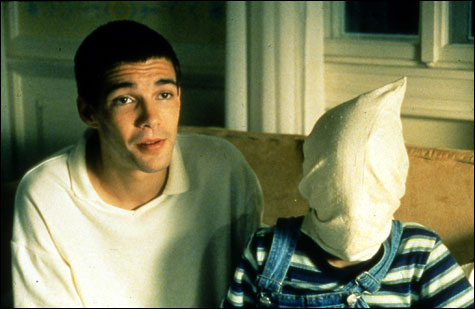
FUNNY GAMES (1997): Never why, only what. |
| “Michael Haneke: A Cinema of Provocation” | Harvard Film Archive + Museum of Fine Arts: October 11–November 3, made possible by the participation of the Goethe-Institut. |
The seemingly endless final shot of Michael Haneke’s CACHÉ|HIDDEN (2005; MFA: October 11 at 7:45 pm) might have shocked some viewers into an almost forgotten skill: watching. There’s no strobe-like editing to pummel a passive audience into conditioned responses — instead, it captivates with a banal, almost unchanging image, a busy school entrance as shot by a security camera. The secret hidden by the movie may be revealed there — the reason for a prolonged, seemingly unprovoked violation of a family and for a sudden, brutal act. Furthermore, the image appears on a TV set — a screen within the movie screen — and so the movie audience becomes self-conscious of its own watching and recognizes that all the bewilderment, emotional distress, revulsion, and fascination with which it’s been entertained has been a manipulative illusion.

In short, the shot subverts the mainstay of commercial moviemaking: the unreflective consumption of the terrifying and taboo. No wonder Hollywood wants to assimilate Haneke — who is the subject of a comprehensive retrospective at the Harvard Film Archive and the Museum of Fine Arts — and, if possible, corrupt him. To this end, perhaps, he’s been enlisted to remake his relentlessly assaultive FUNNY GAMES (1997; MFA: October 20 at noon). The 2007 English-language version will receive its local premiere at the HFA (October 19 at 7:30 pm), with Haneke on hand to answer questions. Although this new film features Hollywood stars Naomi Watts, Tim Roth, and Michael Pitt, Haneke insisted on a shot-by-shot duplication of the original, à la Gus Van Sant’s 1998 Psycho. So maybe it’s he who’s corrupting Hollywood.
Funny Games explores a premise that’s been popular since at least The Desperate Hours (1955) and Cape Fear (1962) and that has since been reduced to graphic simplicity in the recent spate of sado-porn. Two clean-cut young sociopaths, Paul (Arno Frisch, an unpleasant combination of Rob Lowe and Anthony Perkins) and porcine Peter (Frank Gierung), ingratiate themselves into the gated summer home of a pleasant, filthy-rich family. Then they torture the husband, the wife, and the eight-year-old son with a routine of insinuating politeness, sadistic game playing, and physical violence.
One key scene demonstrates the difference between Haneke and, say, Eli Roth. A character steps into a kitchen for a bite to eat. Off screen, a TV blares out the broadcast of an auto race. A shot is followed by sounds of confusion and screaming. The character returns, sandwich in hand, and a cut is made to the TV screen, which is dripping with blood.
As Hitchcock has demonstrated, the suggestion of violence is scarier than its graphic representation. The first stimulates the imagination; the second numbs it. But Haneke won’t permit even this satisfaction. He focuses on the consequences of violence, not the act or its causes. Who else would hold the camera for several minutes on a long shot of a bound victim grieving over a bloody corpse that’s barely in the frame? Neither does he gratify the viewer’s pent-up lust for revenge — after seeming to do so, he resorts to an infuriating device that reminds us, yet again, that this is only a movie.
A movie, though, that raises difficult questions. Throughout Funny Games, the victims keep asking their tormentors why they’re doing this. Ever amused, Paul and Peter treat the question as another part of the game. The bloody TV screen suggests that Haneke is attributing the pair’s behavior to the alienating, dehumanizing effect of the media — in particular, cinema’s exploitation of violence.
Maybe so. But why are audiences drawn to such a spectacle in the first place? An answer might lie in Haneke’s early work for TV, such as his LEMMINGE TEIL 1 —ARKADIEN/LEMMINGS PART 1 — ARCADES (1979; MFA: October 13 at 1:30 pm; HFA: October 20 at 7 pm) and LEMMINGE TEIL 2 — VERLETZUNGEN/LEMMINGS PART 2 — INJURIES (1979; MFA: October 13 at 3:45 pm; HFA: October 20 at 7 pm). Arkadien starts in the late ’50s, when the restless teenage children of the war generation — the “lemmings” of the title, as one disgruntled father labels them — respond to their alienation, guilt, and ennui with meaningless destructiveness and soul-numbing conformity. Verletzungen resumes two decades later, as the lemmings, now adults, respond to their ongoing malaise with more destructiveness and conformity. Bookended by suicides, Lemminge makes some of Rainer Werner Fassbinder’s works on similar themes seem like larks. These people don’t need media violence to fuel their self-loathing, anomie, or repressed viciousness; rather, it provides relief.
The idea that the bourgeois nuclear family bears the seeds of its own immolation gets a literal treatment in the grueling, amazing, made-for-TV film DER SIEBEBENTE KONTINENT|THE SEVENTH CONTINENT (1989; MFA: October 18 at 5:45 pm; HFA: October 27 at 9:45 pm). Based on a real incident Haneke read about in a newspaper (the inspiration, along with German literature, of most of his movies), the treatment proved so uncompromising that even the relatively lenient Austrians wouldn’t broadcast it, and so it became Haneke’s first feature film.